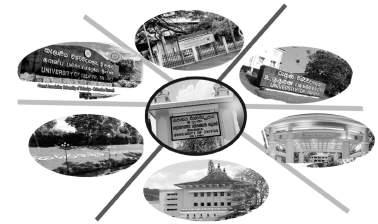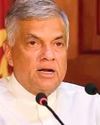Try GOLD - Free
Funding of higher education in Sri Lanka
The Island
|June 19, 2025
Prof. Kumar rightly draws attention to the precipitous decline in state funding for higher education in Sri Lanka from 4.25% of GDP in the 1960s to a mere 1.5% in 2022, and the consequential disparities in revenue-raising capacities, with the University of Colombo generating approximately 20% of its budget independently, while regional universities such as the University of Jaffna and Wayamba University operate with less than 2% (Kumar, 2025).

This fiscal contraction worsens structural inequities and hampers the mission of regional institutions. Ashraf et al. (2012) state that the system resource approach to organisational effectiveness highlights that an institution's ability to secure and use resources is crucial for its success. Without strategic investment and resource redistribution, less-resourced universities will continue to lag behind, perpetuating systemic inequities.
However, in this context, it is important to recognise that looking for alternative revenue sources, like increasing the number of foreign students and forming public-private partnerships, is not just a concession to the market; it is a strategic necessity. These methods can help universities diversify their funding sources, improve their resilience, and lessen their dependence on decreasing public funds. Also, attracting international students and private investment can provide essential resources for infrastructure, faculty development, and research, which supports the broader mission of higher education (British Council, 2024).
Institutional Constraints Over Full Marketisation: The Imperative of Governance Reform
The expectation that public universities transition to full self-funding is neither feasible nor equitable in the absence of substantive governance reforms. Sri Lankan universities remain entangled in rigid administrative frameworks, including protracted approvals for signing MOUs with foreign universities, foreign-funded research and Treasury-mandated procurement protocols, which severely restrict strategic autonomy (Kumar, 2025). The process approach to organisational effectiveness highlights the need for efficient internal operations, trust, and communication as key factors for institutional success (Ashraf et al., 2012). Too much bureaucracy weakens these elements, limiting innovation and responsiveness.
This story is from the June 19, 2025 edition of The Island.
Subscribe to Magzter GOLD to access thousands of curated premium stories, and 10,000+ magazines and newspapers.
Already a subscriber? Sign In
MORE STORIES FROM The Island
The Island
Kadugannawa road repairs: NBRO submits report to RDA, DS
The National Building Research Organization (NBRO) has submitted a report with recommendations on immediate and long-term measures for the landslide affected site at Pahala Kadugannawa to the Kegalle District Secretary, Mawanella Divisional Secretary, and the Road Development Authority (RDA).
1 min
November 26, 2025
The Island
Police probe removal of name boards from archaeological sites in Batticaloa using tractors
Police in Kiran and Pattipalei say they have launched an investigation, based on complaints into the removal of five name boards erected at five archaeological sites located within Batticaloa Manmunai South and Korale Pattu — Valaichchenai Pradeshiya Sabha areas.
1 min
November 26, 2025

The Island
Sri Lankan pride, global glory: Solar Booze sweeps Service and Performance Excellence Awards
Solar Booze (Pvt) Ltd has emerged as one of Sri Lanka’s most recognized renewable energy companies in 2025, celebrating two prestigious awards on both international and national platforms.
1 min
November 26, 2025
The Island
Cabinet nod for renewed agreement with Italy on mutual recognition of driving licences
The Cabinet of Ministers has approved the signing of a renewed agreement with the Italian government on the mutual recognition of driving licences, updating a pact that lapsed in 2021.
1 min
November 26, 2025
The Island
Modi hoists the flag at the Ram Temple in Ayodhya
Prime Minister Narendra Modi on Tuesday marked the completion of the Ayodhya Ram temple by hoisting the saffron Suryavanshi.
2 mins
November 26, 2025

The Island
Namal condemns CID for intimidaing media
SLPP National Organiser MP Namal Rajapaksa has condemned the summoning of Aruna Editor-in-Chief Mahinda Ileperuma to the CID, calling it a blatant act of media suppression and a warning to journalists across the country.
1 min
November 26, 2025
The Island
India brings four labour codes into force, promising reforms amid sharp opposition
India on 21 November 2025 implemented four consolidated labour codes that the government says will modernise decades-old workplace laws, expand social security and simplify compliance —a move welcomed by employers but denounced by trade unions and the opposition as harmful to workers’ rights.
2 mins
November 26, 2025
The Island
Lanka on UN's 2026 anti-torture mission list
Sri Lanka will be one of six countries visited by the UN Subcommittee on Prevention of Torture (SPT) in 2026, as part of a renewed global push to strengthen safeguards against torture and ill-treatment.
1 min
November 26, 2025
The Island
How CSE is designed to fail retail investors
Six Charges, 700% More Expensive:
7 mins
November 26, 2025

The Island
UNP finally admits MR saved country from terrorism
Former UNP Minister Harin Piers publicly declared for the first time that Mahinda Rajapaksa led the country, ignoring all those pundit nay sayers and brought the war against the Liberation Tigers of Tamil Eelam (LTTE) to a successful end.
10 mins
November 26, 2025
Listen
Translate
Change font size

